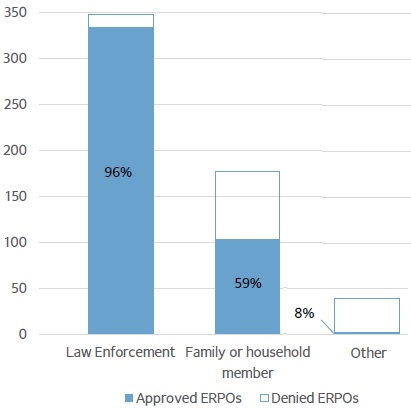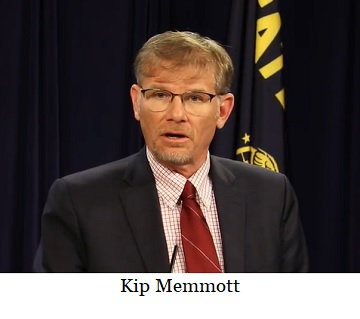“Civil libertarians are troubled by these statistics”
The Audits Division of the Oregon Secretary of State's office, under the leadership of Audit Director Kip Memmott has produced a report entitled, "
An Advisory Report on how Increased Awareness and Training Could Enhance the Effectiveness of Oregon’s Extreme Risk Protection Order Law." Ordinarily, the Audits Division focuses on audits of state agencies, but according to the report, they "chose not to follow [their] traditional audit process because there is not a single state agency responsible for administering Oregon’s ERPO law."

Oregon’s extreme risk protection order law, commonly referred to as a “red flag†law, has been in effect since 2018. According to the report, "the law is intended to reduce incidents of gun violence and suicide through a civil court order that helps prevent individuals at risk from hurting themselves or others from having access to deadly weapons. ERPOs can be requested by family or household members or by law enforcement." The order is produced through an "
ex parte" hearing in which the subject of the hearing is not present and may not even have knowledge of the hearing.
The report asks, then answers 5 questions about the law:
- What is Oregon’s ERPO law and how does it work?
- What state and local entities are involved in the process and what is their role?
- How is Oregon’s ERPO law being used and is it working as intended?
- How does Oregon’s ERPO law compare to best practices and similar laws in other states?
- What resources are available to law enforcement and the public to learn more about Oregon’s ERPO law?
In 2017, the Oregon Legislature passed
SB 719, which created the "Extreme Risk Protection Order" process. According to the report, In the first four and a half years the law was active, a total of 564 ERPOs were requested with 440, or 78%, being granted an
ex parte order issued by a judge. Washington County has the most ERPO petitions with 94. Deschutes was second with 78 and Multnomah and Clackamas completed the top 4 with 70 and 60 respectively. Though it only had 8 ERPO petitions, tiny Lake County had the highest per-capita with 99.1 petitions per 100,000 residents. Josephine County's 45 petitions came in second with 52.0 per 100,000 residents.

Critics of the law cite its lack of due process. During legislative hearings on the bill in 2017,Philip Watson of the Firearms Policy Coalition
described SB 719 as "a measure that would create a process for secretly obtaining 'extreme risk protection orders'. These orders will lead to the confiscation of firearms from unaware Oregonians who are not allowed to confront their accusers nor avail themselves of the protected right of due process."
Kevin Starrett, Executive Director of Oregon Firearms Federation, pointed out that among the justifications for an ERPO are the use of
legal marijuana, or the recent
legal purchase of a firearm. He also noted that when a person is the recipient of an ERPO they are presumed guilty and must prove their innocence at their own expense. "If a licensed mental health professional examines them and declares them mentally fit and not a danger, the are not allowed to use that assessment to defend themselves. Furthermore," he noted “a person who loses his rights and property under and ERPO has not only not been convicted of a crime, they have not even been accused of one.â€
Starret concluded, "The “audit†was not even an official one since it did not meet the Secretary of State’s own qualifications."
The one reference in the report to due process almost treats due process as a stumbling block. The report says,
"While the time related difficulties associated with the ERPO process likely present a barrier for some people in Oregon, they are largely unavoidable because of due process rights. Due process is a fundamental right ensuring fairness and equal treatment in legal matters. For ERPOs this means ensuring that the accused have an opportunity to confront adverse witnesses, be heard before an impartial judge, know opposing evidence, and to present their own evidence at a hearing. Any effort to lessen the impact of the time tax on ERPO processes and proceedings will need to be implemented in a way that ensures the due process rights of ERPO respondents."
The report discusses the risks driving the petitions. "Of the 93 ERPO petitions examined, they found more than 70% of petitions involved respondents with a history of suicidality or reported risk of interpersonal violence, with more than half reported as having a history or risk of both. Researchers also found more than half of the cases were related to threats made within a week of filing the petition, indicating ERPOs were being used in times of immediate crisis. Researchers ultimately concluded ERPOs in Oregon were overwhelmingly being used as intended."
Civil libertarians are troubled by these statistics. One former legislator who voted against
SB 719 asks, "If 78% of the petitions are granted and 70% are "at risk" of suicide or violence, why were the remaining 8% approved? What criteria was used for 'at risk'? One can only assume that the broadest possible criteria were used for 'at risk'"
"What's most troubling about the report is that it fails to acknowledge the rights of firearm owners," the former legislator continued. "It also makes the classic big-government mistake by assuming that all ERPOs are a good thing and that we need more of them. The report claims to have 'undergone the regular quality assurance process,' but it's hard to trust a report that was generated by cheerleaders."
--Staff Reports| Post Date: 2023-09-02 10:43:34 | Last Update: 2023-09-16 16:25:11 |







 Oregon’s extreme risk protection order law, commonly referred to as a “red flag†law, has been in effect since 2018. According to the report, "the law is intended to reduce incidents of gun violence and suicide through a civil court order that helps prevent individuals at risk from hurting themselves or others from having access to deadly weapons. ERPOs can be requested by family or household members or by law enforcement." The order is produced through an "ex parte" hearing in which the subject of the hearing is not present and may not even have knowledge of the hearing.
Oregon’s extreme risk protection order law, commonly referred to as a “red flag†law, has been in effect since 2018. According to the report, "the law is intended to reduce incidents of gun violence and suicide through a civil court order that helps prevent individuals at risk from hurting themselves or others from having access to deadly weapons. ERPOs can be requested by family or household members or by law enforcement." The order is produced through an "ex parte" hearing in which the subject of the hearing is not present and may not even have knowledge of the hearing.
 Critics of the law cite its lack of due process. During legislative hearings on the bill in 2017,Philip Watson of the Firearms Policy Coalition described SB 719 as "a measure that would create a process for secretly obtaining 'extreme risk protection orders'. These orders will lead to the confiscation of firearms from unaware Oregonians who are not allowed to confront their accusers nor avail themselves of the protected right of due process."
Critics of the law cite its lack of due process. During legislative hearings on the bill in 2017,Philip Watson of the Firearms Policy Coalition described SB 719 as "a measure that would create a process for secretly obtaining 'extreme risk protection orders'. These orders will lead to the confiscation of firearms from unaware Oregonians who are not allowed to confront their accusers nor avail themselves of the protected right of due process."